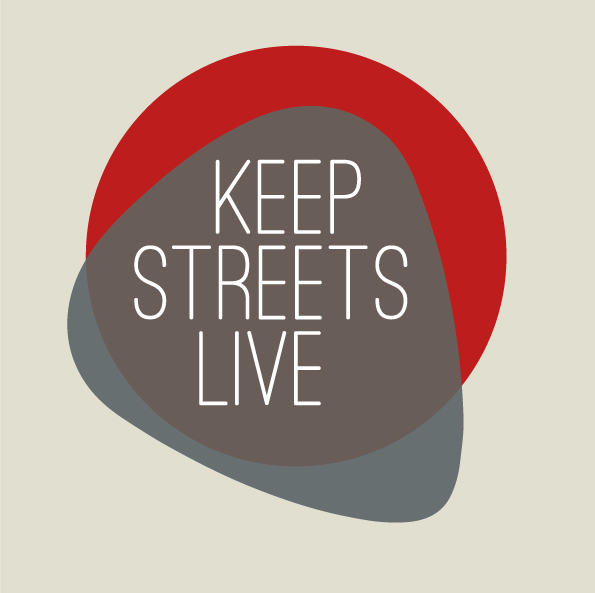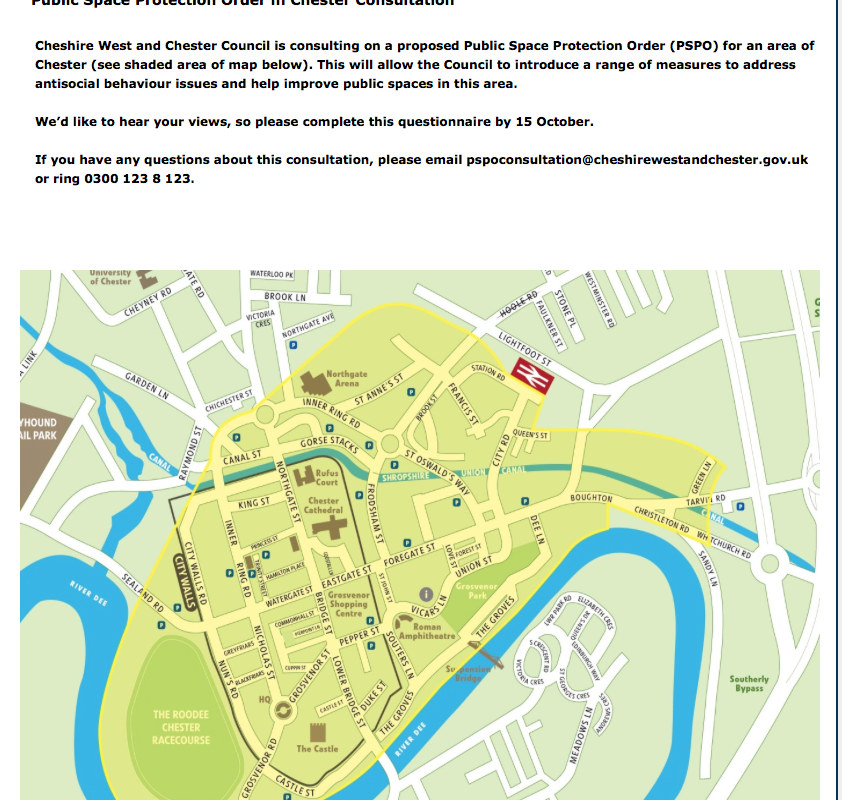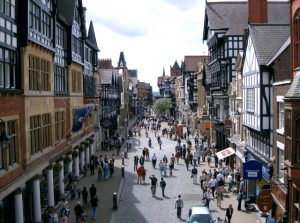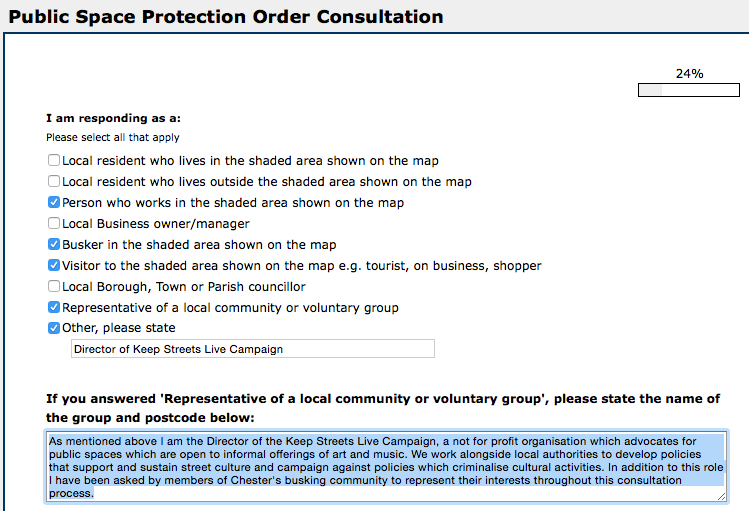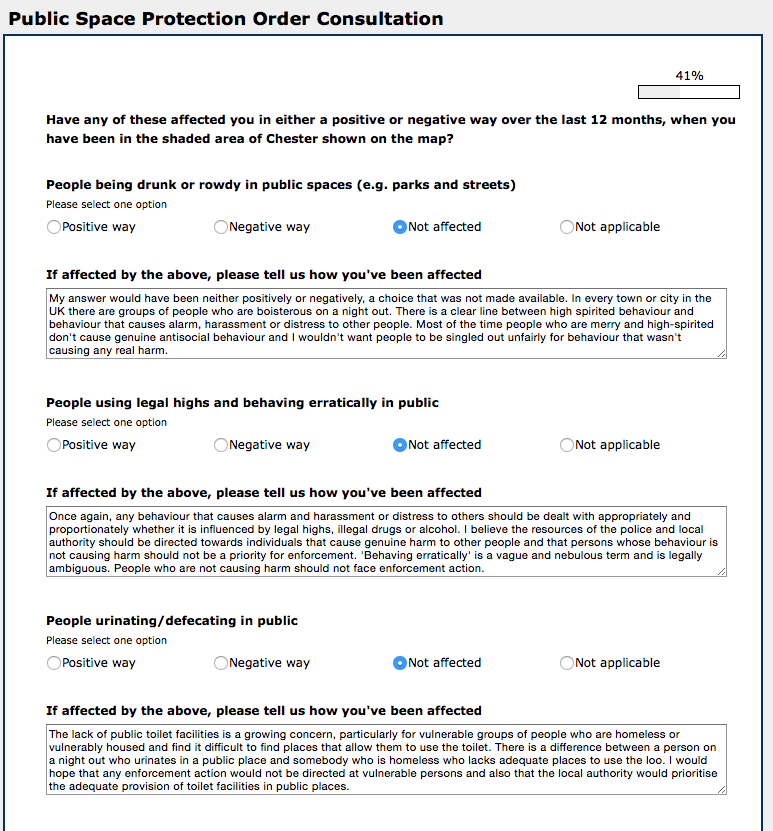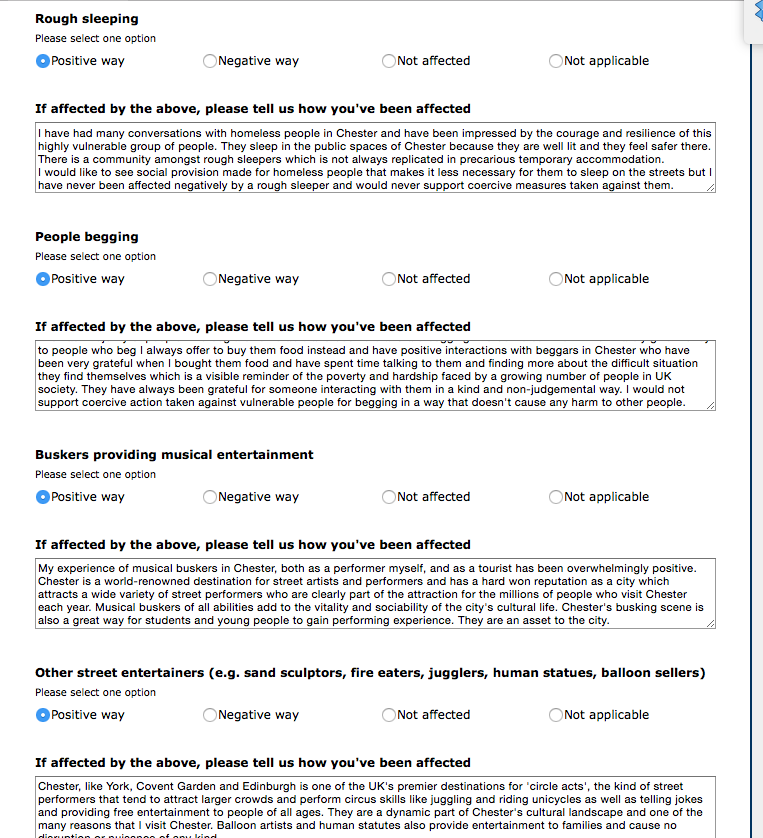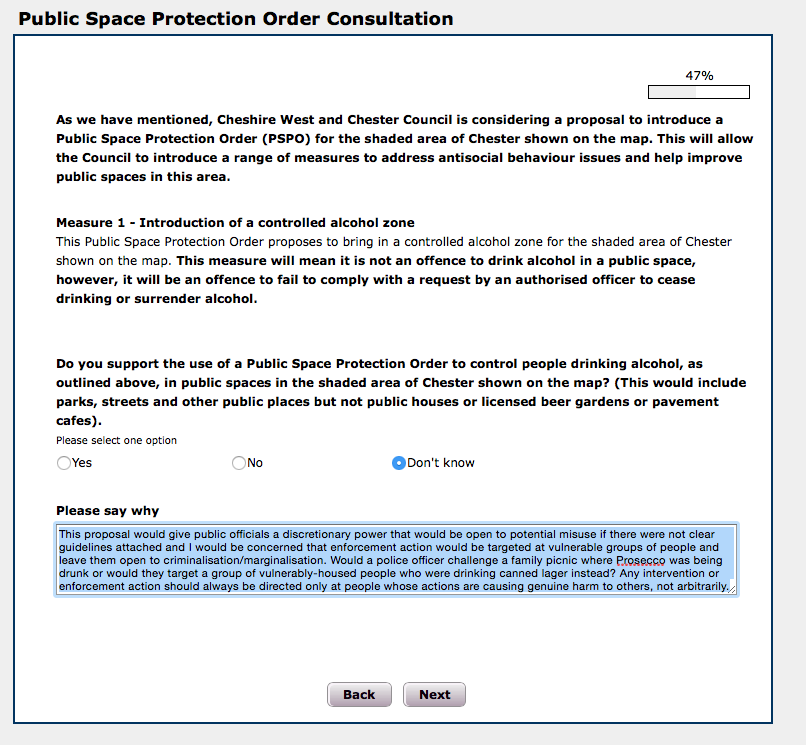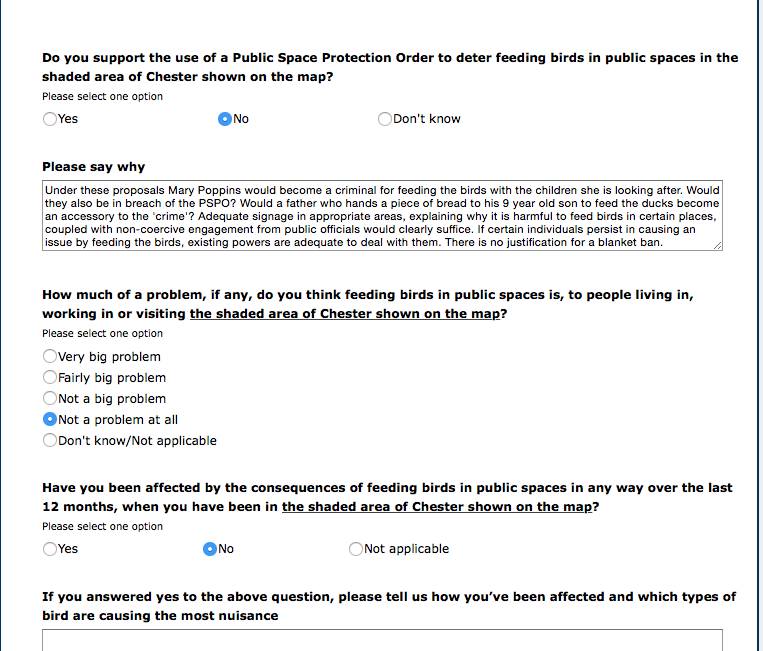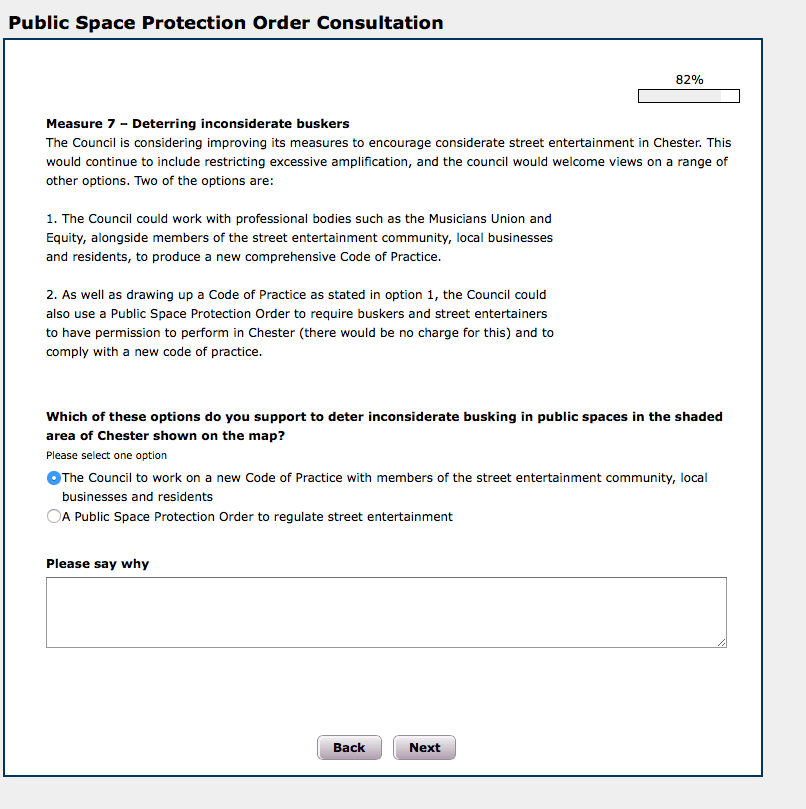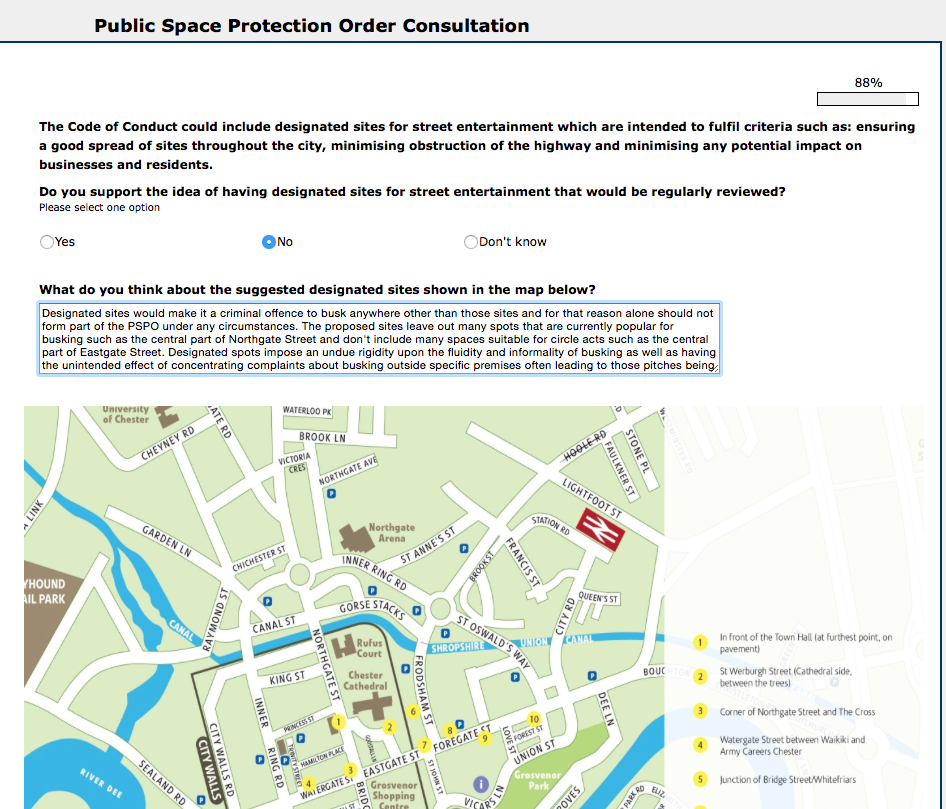Gravesham Borough Council join the attack on street culture with new PSPO proposal

Protect Street Culture: Have your say on Gravesham’s PSPO
We are campaigning against Gravesham Borough Council’s proposal to introduce a ‘Public Space Protection Order’ (PSPO) which, amongst other things would make it a criminal offence punishable by a £1000 fine to play music or sing songs in the street without permission or if you stand in the wrong place, for the wrong length of time . The proposed PSPO would also make it a criminal offence to ‘lie down or sleep in any public place‘, to feed birds and to beg using ‘verbal, non-verbal or written requests’ as well as riding bikes down certain streets. The proposals will have a hugely disproportionate effect upon vulnerable and dispossessed people in Gravesend, particularly the homeless and vulnerably housed as well as representing a direct assault on the spontaneity, informality and democratic access to public space for the arts and street culture that the Keep Streets Live Campaign exists to protect.
Gravesham Borough Council are currently carrying out an online consultation on the proposals which ends on November 15. It is vitally important that people participate in this consultation whether they are residents, visitors, tourists, buskers or people who care about civic freedoms, public space and social justice. The more people who take part in this survey and express their constructive opposition to these damaging proposals, the more chance we have of ensuring that they do not go through. The consultation will take between 10/20 minutes to complete depending upon the amount of detail you go into it. Your response will make a big difference to this campaign, so please find the time to do it if you can!
Link to the online consultation:
http://www.gravesham.gov.uk/services/council-and-democracy/consultations/public-space-protection-order
Link to the petition against the PSPO:
https://www.change.org/p/gravesham-council-don-t-punish-your-homeless-don-t-criminalise-your-buskers-cyclists-and-bird-feeders
We strongly encourage people to take part in this online consultation and to answer the questions as they see fit. We are publishing our answers to a selection of questions on the consultation as a reference for people and to explain our reasons for opposing the PSPO clearly. Please feel free to use our answers as a framework for your own responses
Do you support the use of a Public Space Protection Order to introduce No Alcohol Zones in the areas outlined above? (This would include streets, green areas and other public areas but not public houses, licensed premises or pavement cafes)
No
This proposal would give public officials and police officers a summary power that would be open to potential misuse if there were not clear guidelines attached and I would be concerned that enforcement action would be targeted at vulnerable groups of people and leave them open to criminalisation/marginalisation. Would a police officer challenge a family picnic where Prosecco was being drunk or would they target a group of vulnerably-housed people who were drinking canned lager instead? Any intervention or enforcement action should always be directed only at people whose actions are causing genuine harm to others, not arbitrarily.
Do you support the use of a Public Space Protection Order to deter people using or carrying items used to administer Legal Highs in public spaces in the area marked on the map?
Don’t know.
Once again, any behaviour that causes alarm and harassment or distress to others should be dealt with appropriately and proportionately whether it is influenced by legal highs, illegal drugs or alcohol. I believe the resources of the police and local authority should be directed towards individuals that cause genuine harm to other people and that persons whose behaviour is not causing harm should not be a priority for enforcement. People who are not causing harm should not face enforcement action.
I am concerned about the impact of this measure against vulnerable people leading to criminalisation and marginalisation. The police and local authority have adequate powers to use against people whose behaviour causes alarm/harassment or distress towards other people. They can also use CPNs (Community Protection Notices) to target individuals whose behaviour is having a detrimental effect upon other people. I believe that a targeted approach, based on harm reduction and providing appropriate support to persons with addiction/mental health problems, is much better than blanket ban provisions of the sort proposed.
Do you support the use of a Public Space Protection Order to deter people lying or sleeping in public spaces without prior permission in the area marked on the map?
It shouldn’t be necessary to complete an online survey to explain why these proposals are not only wrong, but also highly unethical. People who sleep rough are amongst the most vulnerable members of our society and subject to violence, harassment alongside the many other difficulties they face on a daily basis. Many choose to sleep in well lit public places because they feel safer there and are amongst people they know. Criminalising rough sleeping in the defined area may well cause people to find other, less safe areas where they could be subject to assault and victimisation. Furthermore, there is no evidence that coercive measures are an effective way of getting people to engage with support services. Some people might ‘choose’ to sleep rough because they feel unsafe in their temporary accommodation or because they are trying to get away from people who are using drugs or alcohol. There is absolutely no justification for enacting a PSPO which incorporates rough sleeping. The local authority should concentrate on providing adequate support services for all people, but even if there were safe and available beds for all homeless people (there aren’t), it would still be unethical and, unlawful, to criminalise people for sleeping rough.
Do you support the use of a Public Space Protection Order to deter the unauthorised collecting of money in public spaces and streets in the area marked on the map?
The vast majority of people who beg are vulnerable and destitute and are begging in order to survive. Whilst I don’t give money to people who beg I always offer to buy them food and have positive interactions with people begging who have always been grateful for someone interacting with them in a kind and non-judgemental way. I would not support coercive action taken against vulnerable people for begging in a way that doesn’t cause any harm to other people.
These measures will clearly affect the most vulnerable and should not be included in the PSPO. People asking for food or money because of desperate poverty should not face criminalisation and punitive fines that they could not reasonably be expected to pay. The proposed measure is ‘catch-all’ in nature by incorporating ‘verbal, non-verbal or written requests’. This will affect people who cause no harm or interference to other people. Enforcement action should only ever be directed against persons who behave in a way that causes alarm, harassment and distress to other people. Adequate powers to deal with this already exist.
In addition, persons issued with fixed penalty notices who are subsequently prosecuted in a magistrate’s court face a mandatory court fee of £150 which has led to the imprisonment of destitute persons in some jurisdictions. This proposal is unethical and wrong. This measure would also catch buskers who busked without ‘prior authorisation’. This wrongly criminalises a cultural activity and is an infringement on Article 10 rights to freedom of expression.
Which of these options do you support to deter inconsiderate busking in public spaces in the area marked on the map?
Do you support the use of a Public Space Protection Order to restrict the riding of bicycles in the gated pedestrianised area of New Road, Gravesend, as marked on the map below?
It should not be a de facto criminal offence to ride a bicycle anywhere provided due consideration is shown to other road users at all times. “The introduction of the fixed penalty is not aimed at responsible cyclists who sometimes feel obliged to use the pavement out of fear of traffic and who show consideration to other pavement users when doing so. Chief police officers, who are responsible for enforcement, acknowledge that many cyclists, particularly children and young people, are afraid to cycle on the road, sensitivity and careful use of police discretion is required. cyclists must give priority to pedestrians and must take the utmost care in areas where pedestrians hold sway. According to the Department for Transport’s Code of Conduct, cyclists need to weigh up whether there’s a critical mass of pedestrians: “In pedestrianised areas, only ride your cycle if there aren’t too many pedestrians about; otherwise dismount and push it.” Existing guidance is more than adequate. The PSPO would potentially criminalise people who are causing no harm to other people.
Do you have any other comments regarding the Public Space Protection Order?
The PSPO proposal wrongly conflates busking, rough sleeping, begging, riding bikes and feeding birds with ‘antisocial behaviour’, a term which is expanding its meaning to incorporate ever greater spheres of human interaction. It targets the vulnerable and marginalised through its provisions on rough sleeping and begging. It targets the cultural and artistic community in its provisions on busking and creates new ‘criminal offences’ which send a damaging message to the UK and beyond about what Gravesend is like and what kind of place it is. The provisions on bird-feeding are silly as well as draconian and betray an over-regulatory mindset which overlooks the crucial principles of policing by consent, equality before the law and proportionality. The council and the police have the use of robust existing legislation such as the 1986 Public Order Act to deal with genuinely antisocial behaviour. It is already a criminal offence to be drunk or disorderly or to cause alarm, harassment and distress to other people. Under the Police, Crime and Antisocial Behaviour Act 2014 the police and local authority have additional powers to use Community Protection Notices (CPNs) against any person whose behaviour is unreasonable, persistent and having a detrimental effect on the quality of life of those in the community. Used as a last resort, the CPNs enable the police or local authority to either issue Fixed Penalty Notices or fines of up to £2500 against persons who breach them. A far better approach to dealing with antisocial behaviour in Gravesham Borough Council would be firstly to separate activities like rough sleeping, begging, bird feeding, and busking from consideration altogether. it was wrong to include these categories in the first place. Secondly, for issues around drunkenness, legal highs, and alcohol the police and local authority should identify those persons whose persistent actions have caused alarm, harassment and distress to other people and targeted enforcement action against those individuals using existing powers. This targeted approach could be achieved by drawing up clear guidance for officers and public officials on how to engage with vulnerable people what the real priorities for enforcement really were. My feeling is that the PSPO approach is about administrative convenience above all else. If an activity is named on a PSPO it becomes an offence by default, even if it is not causing harm or inconvenience to any person. Fixed penalty notices of £100 could be issued to people for sleeping on benches, feeding birds, or singing songs. The fine could rise to £1000 and a criminal record if it goes to court. This punitive and disproportionate response will do little to improve genuine community safety and will come at the expense of freedom of expression and association, freedoms that are intrinsic to life in an open and democratic country. Unlike Fixed Penalty Notices under a PSPO, prosecutions under existing legislation or through the use of Community Protection Notices require the police and the local authority to gather evidence that the person being targeted has caused a genuine issue. This is a protection against arbitrary outcomes and the potential abuse of power. The police and the local authority have an essential role in upholding pubic safety. It is vital that their scare resources are directed towards activities that are genuinely harmful and impacting upon the community, rather than in a scattergun approach against rough sleepers, buskers and bird feeders. Nonetheless the PSPO consultation provides the local authority with a value opportunity to develop a code of practise for busking that has the consent and full participation of the busking community, to examine the provision of services to homeless people, and to develop clear guidance for engagement with vulnerable groups on the part of the local authority. The consultation exercise provides Gravesham Borough Council with a valuable opportunity to reflect upon what kind of place it wishes to be; the kind of place where people are made to feel welcome and included, whether they are a wealthy tourist or an impoverished and vulnerably housed resident, or whether it wishes to be a place where people face a criminal record for singing songs in the street and where, at the time of national housing crisis and widespread cuts to hostels and benefits, it becomes a criminal offence to sleep rough. It is greatly to be hoped that the opportunity to reflect upon these issues created by the consultation results in the wholehearted rejection of any measures that would criminalise the vulnerable and damage street culture.
End of Consultation
